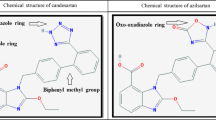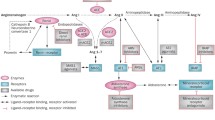Abstract
Increased renin-angiotensin-aldosterone system (RAAS) activity contributes to target-organ damage and increases cardiovascular risk by elevating blood pressure (BP) and through direct effects on the heart, kidneys, brain, and vascular endothelium. Pharmacologic blockade of RAAS effectively reduces BP and limits or reverses various forms of target-organ damage, including cardiac heart failure, coronary artery disease, chronic kidney disease, and left ventricular hypertrophy. Direct renin inhibitors selectively inhibit human renin and have a therapeutic potential similar to angiotensin-converting enzyme inhibitors and angiotensin II receptor blockers. Aliskiren is the only orally active direct renin inhibitor that has been approved for the treatment of hypertension and has been shown to have favorable effects on target-organ damage. It effectively reduces BP and has favorable effects on heart failure and proteinuria in diabetic patients. Additional outcome trials are needed to establish the role of this new class of antihypertensive medication in preventing cardiovascular outcomes.

Similar content being viewed by others
References
Papers of particular interest, published recently, have been highlighted as: • Of importance, •• Of major importance
Pimenta E, Oparil S: Renin inhibitors: novel agents for renoprotection or a better angiotensin receptor blocker for blood pressure lowering? Cardiol Clin 2008, 26:527–535.
Gaddam KK, Oparil S: Renin inhibition: should it supplant ACE inhibitors and ARBS in high risk patients? Curr Opin Nephrol Hypertens 2008, 17:484–490.
Pimenta E, Oparil S: Role of aliskiren in cardio-renal protection and use in hypertensives with multiple risk factors. Vasc Health Risk Manag 2009, 5:453–463.
Gradman AH, Kad R: Renin inhibition in hypertension. J Am Coll Cardiol 2008, 51:519–528.
Nussberger J: Renin inhibitors. In Hypertension, A Companion to Brenner & and Rector’s The Kidney, edn 2. Edited by Oparil S, Weber MA. Philadelphia: Elsevier; 2008:754–764.
Nussberger J, Wuerzner G, Jensen C, Brunner HR: Angiotensin II suppression in humans by the orally active renin inhibitor Aliskiren (SPP100): comparison with enalapril. Hypertension 2002, 39:E1–8.
Sealey JE, Laragh JH: Aliskiren, the first renin inhibitor for treating hypertension: reactive renin secretion may limit its effectiveness. Am J Hypertens 2007, 20:587–597.
Sealey JE, Laragh JH: Aliskiren fails to lower blood pressure in patients who have either low PRA levels or whose PRA falls insufficiently or reactively rises. Am J Hypertens 2009, 22:112–121.
Veniant M, Menard J, Bruneval P, et al.: Vascular damage without hypertension in transgenic rats expressing prorenin exclusively in the liver. J Clin Invest 1996, 98:1966–1970.
Menard J, Azizi M: The difficult conception, birth and delivery of a renin inhibitor: controversies around aliskiren. J Hypertens 2007, 25:1775–1782.
Danser AJ: The increase in renin during renin inhibition: does it result in harmful effects by the (pro)renin receptor? Hypertens Res 2010, 33:4–10.
• Mercure C, Prescott G, Lacombe MJ, et al.: Chronic increases in circulating prorenin are not associated with renal or cardiac pathologies. Hypertension 2009, 53:1062–1069, This experimental study showed that, in transgenic mice, chronic elevations in circulating prorenin increase BP but do not cause cardiac fibrosis or renal glomerular injury.
Gradman AH, Schmieder RE, Lins RL, et al.: Aliskiren, a novel orally effective renin inhibitor, provides dose-dependent antihypertensive efficacy and placebo-like tolerability in hypertensive patients. Circulation 2005, 111:1012–1018.
•• Oh BH, Mitchell J, Herron JR, et al.: Aliskiren, an oral renin inhibitor, provides dose-dependent efficacy and sustained 24-hour blood pressure control in patients with hypertension. J Am Coll Cardiol 2007, 49:1157–1163, This randomized controlled trial demonstrated that aliskiren effectively reduces BP and that 300 mg/d of aliskiren is the maximum effective and safe dose. It also showed that there is no rebound effect on BP after treatment withdrawal.
Dahlöf B, Anderson DR, Arora V, et al.: Aliskiren, a direct renin inhibitor, provides antihypertensive efficacy and excellent tolerability independent of age or gender in patients with hypertension. J Clin Hypertens (Greenwich) 2007, 9(Suppl A):A157.
Brown MJ: Aliskiren. Circulation 2008, 118:773–784.
Dietz R, Dechend R, Yu CM, et al.: Effects of the direct renin inhibitor aliskiren and atenolol alone or in combination in patients with hypertension. J Renin Angiotensin Aldosterone Syst 2008, 9:163–175.
Andersen K, Weinberger MH, Egan B, et al.: Comparative efficacy and safety of aliskiren, an oral direct renin inhibitor, and ramipril in hypertension: a 6-month, randomized, double-blind trial. J Hypertens 2008, 26:589–599.
Villamil A, Chrysant SG, Calhoun D, et al.: Renin inhibition with aliskiren provides additive antihypertensive efficacy when used in combination with hydrochlorothiazide. J Hypertens 2007, 25:217–226.
•• Oparil S, Yarows SA, Patel S, et al.: Efficacy and safety of combined use of aliskiren and valsartan in patients with hypertension: a randomised, double-blind trial. Lancet 2007, 370:221–229. (Published erratum appears in Lancet 2007, 370:1542), This randomized, double-blind, placebo-controlled trial compared the antihypertensive effects and safety of, aliskiren, valsartan, and the combination of aliskiren and valsartan. It showed that the combination of aliskiren and valsartan at maximum recommended doses is safe and provided significantly higher reductions in BP than monotherapy with either agent.
Schmieder RE, Philipp T, Guerediaga J, et al.: Long-term antihypertensive efficacy and safety of the oral direct renin inhibitor aliskiren: a 12-month randomized, double-blind comparator trial with hydrochlorothiazide. Circulation 2009, 119:417–425.
Nickenig G, Simanenkov V, Lembo G, et al.: Efficacy of aliskiren/hydrochlorothiazide single-pill combinations in aliskiren non-responders. Blood Press Suppl 2008, 2:31–40.
• Stanton AV, Gradman AH, Schmieder RE, et al.: Aliskiren monotherapy does not cause paradoxical blood pressure rises: meta-analysis of data from 8 clinical trials. Hypertension 2010, 55:54–60, This meta-analysis demonstrated that, contrary to some beliefs, paradoxical BP rises are similar to other antihypertensive agents and less frequent than with placebo, and that they are not associated with increases in plasma renin activity.
Jordan J, Engeli S, Boye SW, et al.: Direct Renin inhibition with aliskiren in obese patients with arterial hypertension. Hypertension 2007, 49:1047–1055.
Uresin Y, Taylor AA, Kilo C, et al.: Efficacy and safety of the direct renin inhibitor aliskiren and ramipril alone or in combination in patients with diabetes and hypertension. J Renin Angiotensin Aldosterone Syst 2007, 8:190–198.
•• Solomon SD, Appelbaum E, Manning WJ, et al.: Effect of the direct renin inhibitor aliskiren, the angiotensin receptor blocker losartan, or both on left ventricular mass in patients with hypertension and left ventricular hypertrophy. Circulation 2009, 119:530–537, This randomized clinical trial demonstrated that aliskiren is an effective and safe option for patients with left ventricular hypertrophy and that the combination of losartan and aliskiren provides no additional benefit.
• McMurray JJ, Pitt B, Latini R, et al.; Aliskiren Observation of Heart Failure Treatment (ALOFT) Investigators: Effects of the oral direct renin inhibitor aliskiren in patients with symptomatic heart failure. Circ Heart Fail 2008, 1:17–24, This randomized placebo-controlled trial evaluated the effect of aliskiren, in addition to standard heart failure treatment, in patients with CHF. Aliskiren significantly improved the neurohormonal profile without significant differences in BP and biochemistry.
•• Parving HH, Persson F, Lewis EJ, Hollenberg NK; AVOID Study Investigators: Aliskiren combined with losartan in type 2 diabetes and nephropathy. N Engl J Med 2008, 358:2433–2446, This study showed that the DRI aliskiren effectively reduces albuminuria in patients with diabetes and that its effects may be independent of BP-lowering effect.
•• Persson F, Rossing P, Reinhard H, et al.: Renal effects of aliskiren compared with and in combination with irbesartan in patients with type 2 diabetes, hypertension, and albuminuria. Diabetes Care 2009, 32:1873–1879, This double-blind, randomized, cross-over trial demonstrated the combination of aliskiren and irbesartan has more antiproteinuric effect in patients with type 2 diabetes than monotherapy with either agent.
Fisher ND, Jan Danser AH, Nussberger J, et al.: Renal and hormonal responses to direct renin inhibition with aliskiren in healthy humans. Circulation 2008, 117:3199–3205.
Ferrario CM: Addressing the theoretical and clinical advantages of combination therapy with inhibitors of the renin-angiotensin-aldosterone system: antihypertensive effects and benefits beyond BP control. Life Sci 2010, 86:289–299.
Safety and Efficacy of Aliskiren in PostMyocardial Infarction Patients (ASPIRE). Available at http://clinicaltrials.gov/ct2/show/NCT00414609?term=aliskiren+and+heart+failure&rank=2. Accessed January 6, 2010.
Sever PS, Gradman AH, Azizi M: Managing cardiovascular and renal risk: the potential of direct renin inhibition. J Renin Angiotensin Aldosterone Syst 2009, 10:65–76.
Parving HH, Brenner BM, McMurray JJ, et al.: Aliskiren Trial in Type 2 Diabetes Using Cardio-Renal Endpoints (ALTITUDE): rationale and study design. Nephrol Dial Transplant 2009, 24:1663–1671.
Aliskiren Trial in Type 2 Diabetes Using Cardiovascular and Renal Disease Endpoints (ALTITUDE). Available at http://clinicaltrials.gov/ct2/show/NCT00549757. Accessed January 6, 2010.
Efficacy and Safety of Aliskiren and Aliskiren/Enalapril Combination on Morbi-mortality in Patients With Chronic Heart Failure (ATMOSPHERE). Available at http://clinicaltrials.gov/ct2/show/NCT00853658?term=atmosphere+aliskiren&rank=1. Accessed January 6, 2010.
Six Months Efficacy and Safety of Aliskiren Therapy on Top of Standard Therapy, on Morbidity and Mortality in Patients With Acute Decompensated Heart Failure (ASTRONAUT). Available at http://clinicaltrials.gov/ct2/show/NCT00894387?term=astronaut+aliskiren&rank=1. Accessed January 6, 2010.
Disclosure
No potential conflict of interest relevant to this article was reported.
Author information
Authors and Affiliations
Corresponding author
Rights and permissions
About this article
Cite this article
Pimenta, E. Is There a Place on the Shelf for Aliskiren?. Curr Cardio Risk Rep 4, 264–270 (2010). https://doi.org/10.1007/s12170-010-0108-6
Published:
Issue Date:
DOI: https://doi.org/10.1007/s12170-010-0108-6




